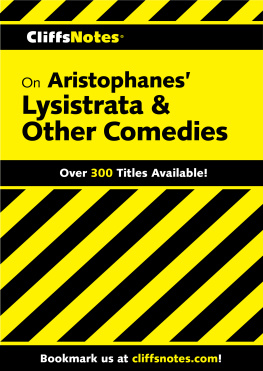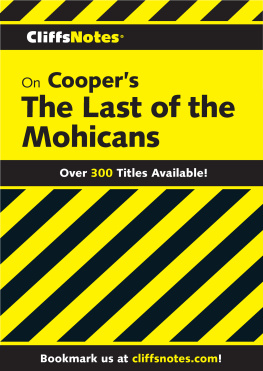Gary K Carey - CliffsNotes on Aristophanes Lysistrata & Other Comedies
Here you can read online Gary K Carey - CliffsNotes on Aristophanes Lysistrata & Other Comedies full text of the book (entire story) in english for free. Download pdf and epub, get meaning, cover and reviews about this ebook. year: 1983, publisher: HMH Books, genre: Romance novel. Description of the work, (preface) as well as reviews are available. Best literature library LitArk.com created for fans of good reading and offers a wide selection of genres:
Romance novel
Science fiction
Adventure
Detective
Science
History
Home and family
Prose
Art
Politics
Computer
Non-fiction
Religion
Business
Children
Humor
Choose a favorite category and find really read worthwhile books. Enjoy immersion in the world of imagination, feel the emotions of the characters or learn something new for yourself, make an fascinating discovery.
- Book:CliffsNotes on Aristophanes Lysistrata & Other Comedies
- Author:
- Publisher:HMH Books
- Genre:
- Year:1983
- Rating:5 / 5
- Favourites:Add to favourites
- Your mark:
- 100
- 1
- 2
- 3
- 4
- 5
CliffsNotes on Aristophanes Lysistrata & Other Comedies: summary, description and annotation
We offer to read an annotation, description, summary or preface (depends on what the author of the book "CliffsNotes on Aristophanes Lysistrata & Other Comedies" wrote himself). If you haven't found the necessary information about the book — write in the comments, we will try to find it.
This CliffsNotes guide includes everything youve come to expect from the trusted experts at CliffsNotes, including analysis of the most widely read literary works.
Gary K Carey: author's other books
Who wrote CliffsNotes on Aristophanes Lysistrata & Other Comedies? Find out the surname, the name of the author of the book and a list of all author's works by series.
CliffsNotes on Aristophanes Lysistrata & Other Comedies — read online for free the complete book (whole text) full work
Below is the text of the book, divided by pages. System saving the place of the last page read, allows you to conveniently read the book "CliffsNotes on Aristophanes Lysistrata & Other Comedies" online for free, without having to search again every time where you left off. Put a bookmark, and you can go to the page where you finished reading at any time.
Font size:
Interval:
Bookmark:
Copyright 1983 Houghton Mifflin Harcourt Publishing Company
All rights reserved.www.hmhco.com
cliffsnotes.com
For information about permission to reproduce selections from this book, write to or to Permissions, Houghton Mifflin Harcourt Publishing Company, 3 Park Avenue, 19th Floor, New York, New York 10016.
The publisher and the author make no representations or warranties with respect to the accuracy or completeness of the contents of this work and specifically disclaim all warranties, including without limitation warranties of fitness for a particular purpose. No warranty may be created or extended by sales or promotional materials. The advice and strategies contained herein may not be suitable for every situation. This work is sold with the understanding that the publisher is not engaged in rendering legal, accounting, or other professional services. If professional assistance is required, the services of a competent professional person should be sought. Neither the publisher nor the author shall be liable for damages arising herefrom. The fact that an organization or website is referred to in this work as a citation and/or a potential source of further information does not mean that the author or the publisher endorses the information the organization or website may provide or recommendations it may make. Further, readers should be aware that Internet websites listed in this work may have changed or disappeared between when this work was written and when it is read.
Trademarks: CliffsNotes, the CliffsNotes logo, Cliffs, cliffsnotes.com, and all related trademarks, logos, and trade dress are trademarks or registered trademarks of Houghton Mifflin Harcourt Publishing Company. All other trademarks are the property of their respective owners. Houghton Mifflin Harcourt is not associated with any product or vendor mentioned in this book.
eISBN 978-0-544-18262-2
v1.0517
ARISTOPHANES COMEDIES
A well-known American celebrity, being interviewed on TV, was asked about his singing career, and he said, I sing mostly country-western songs because they tell it how it is. In a sense, that is what Aristophanes tried to do in his comedies: tell it how it is. For over fifty years, the Greek stage had been dominated by superlative, but often depressing and emotional tragedies. Suddenly, Aristophanes introduced first-rate earthy, comic dramas to the Greek audiences. Theater has never been the same since. Aristophanes comedies were radical and lasting innovations.
Aristophanes, however, was not a man whom one would label as funny; his plays are not filled with a series of one-liners. He was a very serious comic writer, keenly aware of his debt to earlier dramatistsin particular, to Aeschylus, the playwright often referred to today as the father of Greek tragedy. Both Aeschylus and Aristophanes held similar viewpoints about Athens, and readers can better understand Aristophanes comedies if they have some knowledge of the cultural context that preceded Aristophanes and if they have some knowledge of Aeschylus and other early Greek dramatists.
Like Aristophanes, Aeschylus grew up in a country that was shaken almost daily by the tremors of impending war. The mighty enemy of the Persian Empire was a continual threat to Athens peace, and young Aeschylus gained a place in history as a valiant warrior/soldier long before he attained fame as a dramatist. His name is linked forever with the crucial Battle of Marathon, and his early poetry is filled with an abundance of allusions to the painful hardships and miseries of war.
When Aeschylus finally began writing dramas, he was middle-aged, but his genius was recognized almost immediately. He wrote over eighty known plays, and at least thirteen times during his lifetime he won first prize in the Athens drama festivals. After Aeschylus death, according to the few records that have survived, his plays continued to win awards, and he accumulated at least thirteen additional first-place awards during their revivals.
When we speak of Western Civilization, we begin with the Greeks, and we turn to their epics and dramas to discover what Western Civilization was like in the beginning. Almost all Western world literature anthologies begin with Greek literature, usually with their epics and with the plays of Aeschylus. Remarkably, this literature is as fresh and as exciting to us today as it was to the Greeks of Aeschylus era. Frequently critics lament the fact that only seven of Aeschylus plays have survived intact. It is surprising, though, that these seven plays have survived. When we consider the composition of paper/papyrus itself, how ink was made, as well as the whole concept of writing down dramas and preserving them, these seven plays seem like priceless treasuresas do the few facts that we know about Aeschylus himself.
Perhaps the most important information about this early Greek playwright is not found in formal recordsthat is, his birth date or the date when he died, or the dates of his martial triumphs and his dramatic victories. The most critical keys to understanding Aeschylus lie in the plays themselves; it is there that we discover his point of view about men and women and war, about culture, and about the Greek godsin short, how he felt about his society and his city of Athens, and about the future of the perilous Hellenic civilization. For example, had Aeschylus not been both a warrior and a poet/playwright, his dramas probably would not have reflected so intensely and clearly his belief that Athens and its culture must survive. But Aeschylus was clearly bent on hisand Athenssurvival. In one of Athens most crucial battles, the naval encounter with the Persians at Salamis, Aeschylus was present. He witnessed the crushing defeat of the Persian fleet. Athens was saved forever from being absorbed into the antithetical, powerful forces of Oriental thought and principles.
Greece became an empire, and Athens new, original Western thinking and creativity were hers to nurture. She did just that, and it was in her plays and epics that we have the synthesis of her unique interpretations of lifeof the importance of literature, dance, theater, and art to daily living. Most of her early creativity has its roots in her literature and many of her contributions to Western civilization have their genesis in her dramas.
Aeschylus family belonged to the aristocracy of Athens, and he believed that part of the reason why the Greek peninsula had such trouble containing and countering its enemies was because it was fragmented into so many disparate city-states and factions. In his own city-state of Athens, he saw a microcosm of the Greek nation torn by political rupture: the masses vs. the aristocracy. Remember that Aeschylus was in his forties and fifties when he wrote most of his best plays. He mistrusted young upstarts who were filled with an abundance of youthful pride and energy and new ideas about how Athens should be governed. Aeschylus was a political conservative. His values and mores had been tested by time and by war. Athens had survived because of them; they were not to be tampered withor questioned. Aeschylus believed that Athens was heir to a high principle and purpose, something outside herselfFate, Death, Destinyand a person was supposed to cope with it, fear it, and revere it. New ideas involving innovation and resolutions to fate and to foreigners were heresy to him. Man, he believed, should not attempt to create new answers or solutions to lifes calamities. Those physical and intellectual battles had already been fought. To give credence to too much innovation was to invite anarchy. Order was fundamental for survival.
For his Oresteia, Aeschylus chose a myth six or seven hundred years old and used it as a dramatic vehicle on which to hang his ideas. At the core of the trilogy is the murder of a king and the retributions that result. In the plays, Aeschylus shows that in some matters, there is no resolution. We must strive to structure some sort of order to our lives, but, ultimately, we are at the mercy of the gods, and the gods are as unpredictable as the weather. Once a citizen recognizes this fact, he should try to build a solid structure of government as well as a strong social structure, both of which will withstand foreign powers, internal strife, and hopefully, the worst of the gods wrath. A healthy fear is necessary if man, and Athens, were to continue to survive.
Next pageFont size:
Interval:
Bookmark:
Similar books «CliffsNotes on Aristophanes Lysistrata & Other Comedies»
Look at similar books to CliffsNotes on Aristophanes Lysistrata & Other Comedies. We have selected literature similar in name and meaning in the hope of providing readers with more options to find new, interesting, not yet read works.
Discussion, reviews of the book CliffsNotes on Aristophanes Lysistrata & Other Comedies and just readers' own opinions. Leave your comments, write what you think about the work, its meaning or the main characters. Specify what exactly you liked and what you didn't like, and why you think so.













